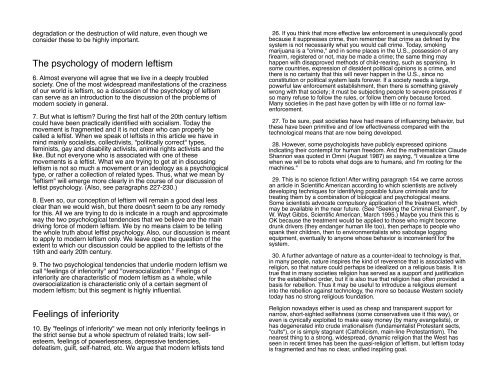Unabomber Manifesto - ouroboros ponderosa
Unabomber Manifesto - ouroboros ponderosa
Unabomber Manifesto - ouroboros ponderosa
You also want an ePaper? Increase the reach of your titles
YUMPU automatically turns print PDFs into web optimized ePapers that Google loves.
degradation or the destruction of wild nature, even though weconsider these to be highly important.The psychology of modern leftism6. Almost everyone will agree that we live in a deeply troubledsociety. One of the most widespread manifestations of the crazinessof our world is leftism, so a discussion of the psychology of leftismcan serve as an introduction to the discussion of the problems ofmodern society in general.7. But what is leftism? During the first half of the 20th century leftismcould have been practically identified with socialism. Today themovement is fragmented and it is not clear who can properly becalled a leftist. When we speak of leftists in this article we have inmind mainly socialists, collectivists, "politically correct" types,feminists, gay and disability activists, animal rights activists and thelike. But not everyone who is associated with one of thesemovements is a leftist. What we are trying to get at in discussingleftism is not so much a movement or an ideology as a psychologicaltype, or rather a collection of related types. Thus, what we mean by"leftism" will emerge more clearly in the course of our discussion ofleftist psychology. (Also, see paragraphs 227-230.)8. Even so, our conception of leftism will remain a good deal lessclear than we would wish, but there doesn't seem to be any remedyfor this. All we are trying to do is indicate in a rough and approximateway the two psychological tendencies that we believe are the maindriving force of modern leftism. We by no means claim to be tellingthe whole truth about leftist psychology. Also, our discussion is meantto apply to modern leftism only. We leave open the question of theextent to which our discussion could be applied to the leftists of the19th and early 20th century.9. The two psychological tendencies that underlie modern leftism wecall "feelings of inferiority" and "oversocialization." Feelings ofinferiority are characteristic of modern leftism as a whole, whileoversocialization is characteristic only of a certain segment ofmodern leftism; but this segment is highly influential.Feelings of inferiority10. By "feelings of inferiority" we mean not only inferiority feelings inthe strict sense but a whole spectrum of related traits; low selfesteem,feelings of powerlessness, depressive tendencies,defeatism, guilt, self-hatred, etc. We argue that modern leftists tend26. If you think that more effective law enforcement is unequivocally goodbecause it suppresses crime, then remember that crime as defined by thesystem is not necessarily what you would call crime. Today, smokingmarijuana is a "crime," and in some places in the U.S., possession of anyfirearm, registered or not, may be made a crime; the same thing mayhappen with disapproved methods of child-rearing, such as spanking. Insome countries, expression of dissident political opinions is a crime, andthere is no certainty that this will never happen in the U.S., since noconstitution or political system lasts forever. If a society needs a large,powerful law enforcement establishment, then there is something gravelywrong with that society; it must be subjecting people to severe pressures ifso many refuse to follow the rules, or follow them only because forced.Many societies in the past have gotten by with little or no formal lawenforcement.27. To be sure, past societies have had means of influencing behavior, butthese have been primitive and of low effectiveness compared with thetechnological means that are now being developed.28. However, some psychologists have publicly expressed opinionsindicating their contempt for human freedom. And the mathematician ClaudeShannon was quoted in Omni (August 1987) as saying, "I visualize a timewhen we will be to robots what dogs are to humans, and I'm rooting for themachines."29. This is no science fiction! After writing paragraph 154 we came acrossan article in Scientific American according to which scientists are activelydeveloping techniques for identifying possible future criminals and fortreating them by a combination of biological and psychological means.Some scientists advocate compulsory application of the treatment, whichmay be available in the near future. (See "Seeking the Criminal Element", byW. Wayt Gibbs, Scientific American, March 1995.) Maybe you think this isOK because the treatment would be applied to those who might becomedrunk drivers (they endanger human life too), then perhaps to people whospank their children, then to environmentalists who sabotage loggingequipment, eventually to anyone whose behavior is inconvenient for thesystem.30. A further advantage of nature as a counter-ideal to technology is that,in many people, nature inspires the kind of reverence that is associated withreligion, so that nature could perhaps be idealized on a religious basis. It istrue that in many societies religion has served as a support and justificationfor the established order, but it is also true that religion has often provided abasis for rebellion. Thus it may be useful to introduce a religious elementinto the rebellion against technology, the more so because Western societytoday has no strong religious foundation.Religion nowadays either is used as cheap and transparent support fornarrow, short-sighted selfishness (some conservatives use it this way), oreven is cynically exploited to make easy money (by many evangelists), orhas degenerated into crude irrationalism (fundamentalist Protestant sects,"cults"), or is simply stagnant (Catholicism, main-line Protestantism). Thenearest thing to a strong, widespread, dynamic religion that the West hasseen in recent times has been the quasi-religion of leftism, but leftism todayis fragmented and has no clear, unified inspiring goal.






